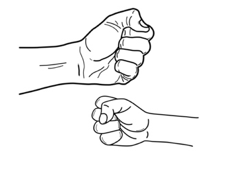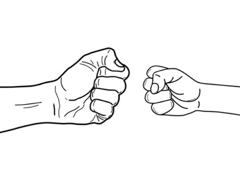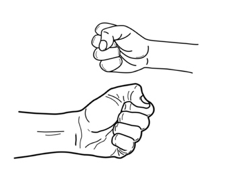"A frightened Captain makes a frightened crew." - Lister Sinclair
Most of us love our children dearly, but they can trigger our upset like no one else can! Feeling disrespected or unappreciated, we may shout, scold or threaten our kids, despite desperately wishing we could keep our cool.
In my work, I talk about three ways that we can relate to our children. Using my right hand to represent the parent and my left hand to represent the child, the right hand is above the left when we are what I call the Captain of the ship, staying loving, calm and confident -- even when our children's behavior isn't what we would like it to be.
When we are interacting in this way, our kids see us as steady and reliable, and they relax in the knowledge that we are able to navigate their stormy seas without leaping over the side of the ship when the going gets rough.
When our children do or say something that annoys us, we often move into what I call Lawyer mode. No one is in charge and we're caught in an argument or power struggle with each side trying to "win."
And when our child does something that really upsets us, we move into Dictator mode, resorting to bribes, threats or punishments to try to control our children's behavior. Our connection feels stressful and strained. Oftentimes, we are plagued with guilt in the aftermath of these explosive encounters.
Let's say your son asks if you'll make him pasta with butter after you've served him the healthy dinner you've worked hard to make. As the Captain of the ship, you might say, "I know you like pasta and butter, and this stew doesn't look as yummy. Unfortunately, this is the only dinner I'm making tonight, sweetheart. You're welcome to put together a sandwich if you'd like." You don't feel outraged because you haven't taken your child's behavior personally.
He may say, "It's not fair! You never make what I like!" If you tell yourself that he doesn't appreciate all you do for him, or that he should be more flexible with his eating, you may angrily defend or explain yourself. "That's ridiculous! Just the other night I made your favorite casserole..." You're now in Lawyer mode.
And if things deteriorate still further, he might announce in fury, "I'm not eating this stupid stew! I hate your cooking!" Feeling desperate and out of control, you angrily react by saying, "Don't eat, then! You don't know how lucky you are!" You're now in Dictator mode, feeling hurt and disrespected because you've built a case in your mind about why he "should" treat you better.
We all have our trigger points and sensitivities, and our kids seem to have laser accuracy in hitting our buttons. But the solution to parenting without power struggles isn't about changing our children. It begins by addressing the stressful stories and beliefs that cause us to push against them in ways that make things worse.
One of the key elements I use to help parents avoid moving into Lawyer or Dictator mode is The Work by Byron Katie. This powerful approach is based on the understanding that it's not the events around us that cause us to become hurt, worried or angry, but our thoughts about those events.
In the context of parenting, it's our beliefs and stories about how our kids should behave that cause us to lose our cool. We know we're believing a stressful story if our blood pressure rises or we start shouting and threatening. Or we may withdraw from our child, punishing him by ignoring or distancing ourselves.
The Work is about examining our stressful beliefs and reactions so that we can be free of their negative influence, becoming that Captain of the ship our children instinctively want to cooperate with. It is a very simple but powerful method for neutralizing the harmful, upsetting beliefs that derail our efforts to respond sanely instead of reacting out of anger.
This approach starts by looking for the thought or belief that gets your blood boiling--one that that gets you to go from zero to sixty in a few seconds. It might be something like:
"My daughter shouldn't sneak candy."
"My son should turn off his video games when I ask."
"My kids shouldn't tease each other."
These upsetting beliefs throw us off our game and cause us to lose our ability to be the calm Captain of the ship. They also cause us to come at our kids, provoking defiance or resistance, rather than alongside them in ways that activate a natural desire to please us.
Instead of building a lawyerly case for why our son shouldn't want us to make a separate meal of pasta and butter, we might soften -- and be better able to approach the situation without escalating it -- if we consider the reasons it makes sense that he would want a different dinner. Pasta and butter is pretty darn good... he has a very simple palate... he's never really liked meat stew.
Taking it further, we could even look at the ways we sometimes want something other than what we've been given. And then those difficult moments of parenting become opportunities for looking at and healing some of our own challenging issues. In fact, as I talk about in my newest book, our children can actually become our very best teachers, if we use the difficult parenting moments as opportunities for our own growth and transformation.
I hope you'll join me for a very special three-part webinar series with Byron Katie on The Work and Parenting. The Huffington Post will be hosting the simulcast and you can view it right here, at the top of this post. You may also find replays by registering here.
When we clean up the thoughts and stories that precipitate our anger, fear or disappointment, our children become receptive to our guidance. We don't have to live in Lawyer or Dictator mode. We can be that calm and loving Captain. What a relief! Our parenting days really can be easier and more enjoyable. I hope you'll join us to learn more.
Susan Stiffelman is the author of Parenting Without Power Struggles: Raising Joyful, Resilient Kids While Staying Cool, Calm and Connected and the brand new Parenting with Presence: Practices for Raising Conscious, Confident, Caring Kids (An Eckhart Tolle Edition). She is a family therapist, parent coach and internationally recognized speaker on all subjects related to children, teens and parenting.
To learn more about her online parenting courses and support, visit her Facebook page or sign up for her free newsletter.
Do you have a question for the Parent Coach? Send it to askparentcoach@gmail.com and you could be featured in an upcoming blog post.


